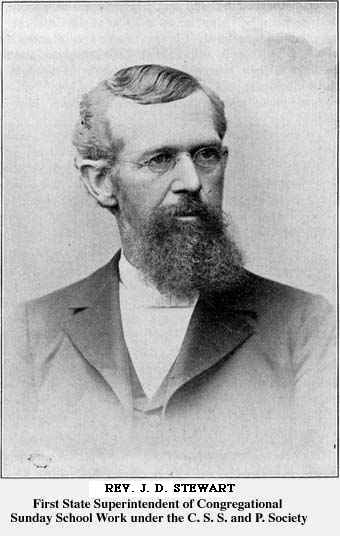
| 60 |
CONGREGATIONAL NEBRASKA
|
NEGenWeb Project
Resource Center
Church
The period of the '70s witnessed a steady development of church life and the beginning of systematic state Sunday school work, which has been so ably carried on by Rev. J. D. Stewart, the only state superintendent of Sunday school work Nebraska has had, and the first superintendent appointed by our National Sunday School and Publishing Society, though preceded by Superintendent Maile in actual service.
Superintendent Stewart, formerly minister at Hastings, was called to the state Sunday school work in 1882; but it was in 1879 that resolutions calling for a national Sunday school secretary, and for Sunday school institutes, normal classes, and greater efficiency in Sunday school training in our Nebraska churches were passed.1 These were the initial steps which led up to the present system of Sunday school work in the state. A letter2 from Superintendent Stewart telling of pioneer experiences may well be introduced here:
"Pioneer work, laying foundations for Christian institutions and character, mostly on the frontier and in new towns, leaves fragrant and lasting memories. To preach the gospel of good citizenship to new communities, while enterprising business men sit on improvised seats in unfurnished store buildings; to return after the women and children arrive, organize Sunday schools and develop them into churches, visit their homes, baptize their children, marry their young people, and bury their dead, is to establish enduring relations with a multitude of families. To

| 60 |
CONGREGATIONAL NEBRASKA
|
travel in, the country and find Christian women, mothers of large families, living far away from all Christian privileges, waiting anxiously for the missionary to come and start Sunday schools, to hear their earnest prayers and see the tears in their eyes when their children are brought to Christ during special evangelistic meetings held with the mission Sunday schools, is enough to gladden any Christian heart.
"To cooperate with pastors and superintendent, gather the people into churches, schoolhouses, halls, or tents., hold normal institutes, conventions, and grove meetings, teach Bible lessons, discuss the best way to make the Sunday school successful, to see the children and young people take notes, all anxious to learn 'more about Jesus,' is the most satisfactory work a man can be engaged in. This has been our experience for twenty-two years."
In this realistic pen picture of missionary life we see how the Sunday school missionary is intimately connected with the home missionary superintendent in upbuilding Christian work in pioneer fields.
The development of the state called for such help, and it was provided. The work continues. The railroad development in the state has enlarged the pioneer work of the missionary. There are whole counties with but few gospel privileges. The demand for more men is urgent. Telephones are preceding the missionary in the sandhills and ranches of the West.
January 10, 1880, witnessed the translation of the pioneer preacher and founder of Congregational churches in Nebraska. A brief service was held in Fontanelle where he died, conducted by Rev. J. E. Heaton of Fremont, and more extended services were held in Omaha. At the fol-
|
SUNDAY SCHOOL DEVELOPMENT
|
61
|
lowing state association held in Hastings, October, 1880, appropriate memorial services were held. "The service was conducted by Rev. A. F. Sherrill, and after the memorial paper prepared by Rev, Julius A. Reed, remarks were made by Rev. J. G. Spencer, Rev. A. Dresser, and Rev. Dr. (H. M.) Storrs. Extracts were read from letters written by Rev. Dr. Salter of Burlington, Iowa, Rev. Dr.
Magoun of Iowa College, and Rev. Daniel Lane of Iowa."3
In this service Nebraska paid loving tribute to the memory of the man who has done more than any other one man to build up our Congregational Zion in the state.
This year also Supt. H. N. Gates made his last report as superintendent of home missions. He returned to pastoral
3 Minutes, 1880, p. 29.
| 62 |
CONGREGATIONAL NEBRASKA
|
work, taking charge of the church in David City for a few years, and then went to New England, where he passed the last years of his life. His sister, Mrs. A. N. Goddard, of New Britain, Connecticut, writes
"His work to a great extent was organizing and encouraging feeble churches, traveling some ten thousand miles a year in that state [Nebraska]. He spent the summer of 1876 at the East, preaching in many city churches, in the interest of home missions, and induced a number of theological students to go west to work through their long vacation, guaranteeing them $100 each, and the money was raised. Another time, when the home society could not meet the quarterly payments of the needy missionaries, he advanced the money to them, taking no interest, until they could repay. At the time of the grasshopper scourge, great quantities of clothing were sent to them, and he, with the help of his wife, distributed not only to missionaries, but other destitute families. He helped in founding Gates College, named for him contrary to his wishes, and felt a great interest in it, doing all by his influence for it in his power, and when it seemed best no longer to keep it as a college, was disappointed. His last years were quietly spent in Medford, Massachusetts, reading much, keeping up with the times, and waiting the Lord's time to take him. He talked much of the future and had no dread of the end."4
Mrs. Goddard was with her brother the last nine and one-half years of his life and heard much from his lips of his experiences in Nebraska.
Traveling over the state was more difficult in pioneer times than it is to-day with our splendid railroad systems, but even now a sixty-mile drive over sandhills and prairie is by no means uncommon.